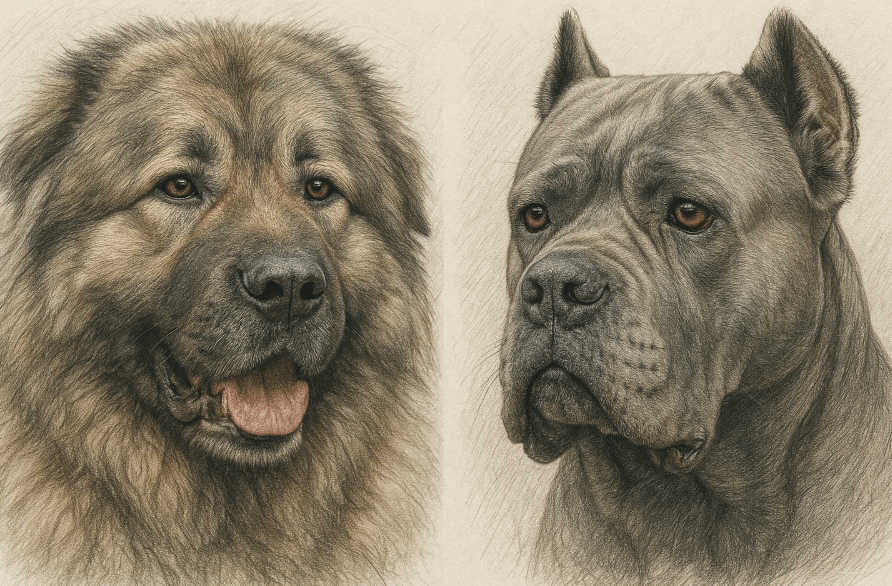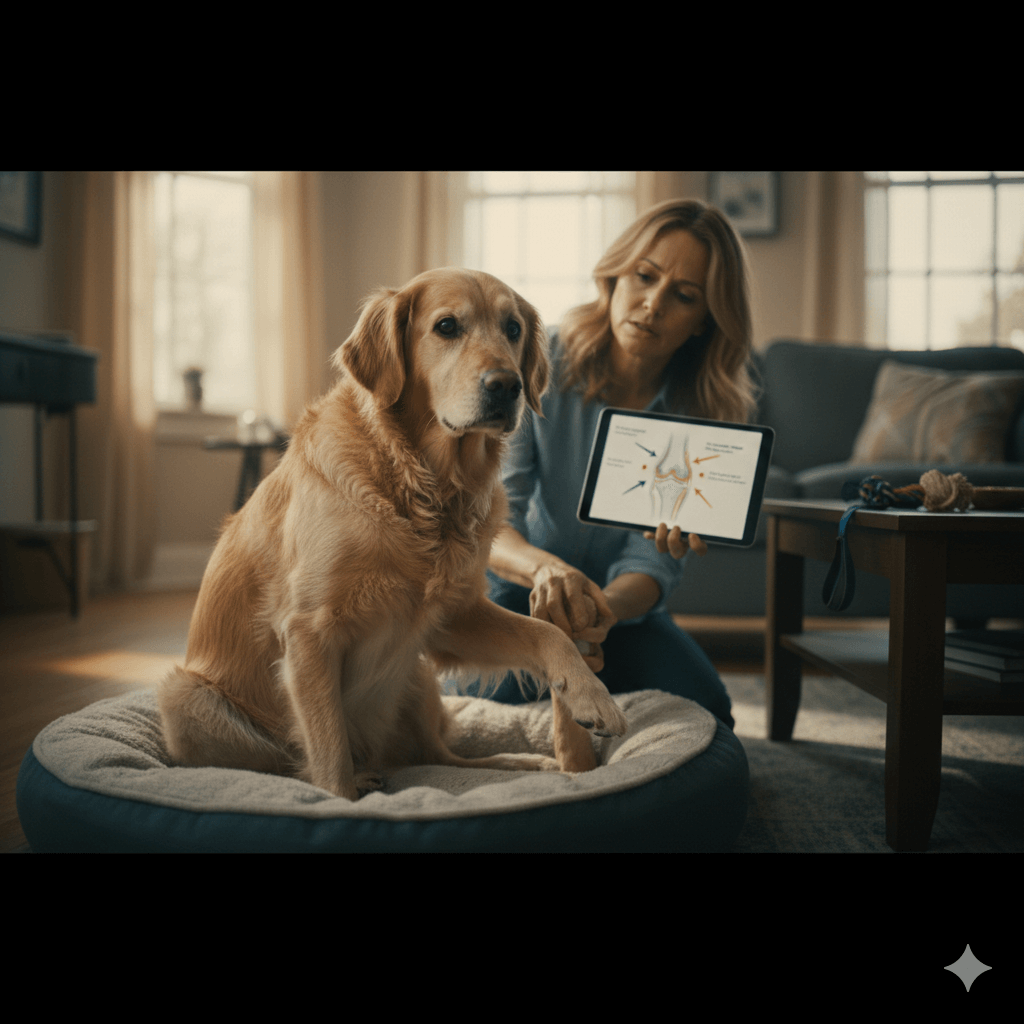Caucasian Shepherd vs Cane Corso: Which Giant Guardian is Right for You?
When it comes to large, powerful breeds, the Caucasian Shepherd and the Cane Corso are two of the most impressive and loyal dogs you can find. Both are known for their protective instincts, strength, and unwavering devotion to their families. However, these breeds differ significantly in temperament, size, energy levels, and care requirements. Whether you’re looking for a gentle giant or a versatile working dog, understanding the unique traits of each breed is essential to making an informed decision. In this blog post, we’ll compare the Caucasian Shepherd and the Cane Corso across various factors to help you determine which breed aligns best with your lifestyle.
Key Differences Between the Caucasian Shepherd and Cane Corso
While both breeds share some similarities as guardians, their differences make them suited for distinct roles and environments. Here’s a breakdown of the key contrasts between these majestic giants.
Size and Build:
The Caucasian Shepherd is larger and heavier, often weighing up to 170 pounds, while the Cane Corso is more athletic and compact, typically weighing between 90-120 pounds.Temperament and Personality:
The Caucasian Shepherd is calm, independent, and reserved, whereas the Cane Corso is energetic, trainable, and more social with strangers when properly introduced.Energy Levels:
The Cane Corso requires more daily exercise and mental stimulation compared to the lower-energy Caucasian Shepherd, who prefers lounging around the home.Training Challenges:
The Cane Corso is highly intelligent and eager to please, making training easier, while the Caucasian Shepherd’s stubborn streak demands patience and consistency.Guarding Instincts:
Both breeds excel as protectors, but the Caucasian Shepherd’s territorial nature makes them more inclined toward guarding property, while the Cane Corso focuses on protecting people.
These distinctions highlight the unique strengths and needs of each breed, helping you decide which one suits your household better.
Physical Characteristics of the Caucasian Shepherd and Cane Corso
The physical appearance of these breeds reflects their origins and intended purposes, from rugged mountain guardians to agile Italian hunters.
Coat Type and Grooming Needs:
The Caucasian Shepherd has a thick double coat that requires regular brushing, especially during shedding seasons, while the Cane Corso’s short coat is low-maintenance and easy to clean.Height and Weight Range:
Caucasian Shepherds stand 23-30 inches tall and weigh 110-170 pounds, whereas Cane Corsos are slightly smaller at 23-28 inches and 90-120 pounds.Facial Features:
The Cane Corso has a sleek, muscular build with a square-shaped head, while the Caucasian Shepherd sports a bear-like face with a broader skull and dense fur.Lifespan Expectancy:
The Cane Corso generally lives 9-12 years, while the Caucasian Shepherd tends to live 10-12 years due to its robust constitution.Color Variations:
Cane Corsos come in shades like black, fawn, gray, and brindle, while Caucasian Shepherds display colors such as white, gray, tan, and pied patterns.
Their striking appearances and functional builds make both breeds visually stunning yet practical for their respective roles.
Check this guide 👉Cane Corso Saint Bernard Mix: Best 7 Expert Tips!
Check this guide 👉Cane Corso Greyhound Mix: Best 7 Expert Tips!
Check this guide 👉Cane Corso Dachshund Mix: Best 7 Expert Tips!

Caucasian Shepherd Traits | Cane Corso Traits |
|---|---|
Large size, weighing up to 170 lbs | Athletic build, weighing 90-120 lbs |
Calm and independent temperament | Energetic and trainable personality |
Thick double coat requiring grooming | Short coat with minimal maintenance |
Strongly territorial and protective | People-focused protection tendencies |
Lower exercise needs, prefers rest | High energy, requires daily activity |
Care Requirements for the Caucasian Shepherd and Cane Corso
Both breeds demand significant commitment, but their care needs vary based on their temperaments and lifestyles. Understanding these requirements ensures a harmonious relationship.
Exercise Needs:
The Cane Corso thrives on vigorous activities like running, hiking, or agility training, while the Caucasian Shepherd is content with moderate walks and playtime.Grooming Routine:
Regular brushing is essential for the Caucasian Shepherd to manage shedding, while the Cane Corso only needs occasional baths and nail trims.Socialization Importance:
Early exposure to different environments, people, and animals is crucial for the Cane Corso, while the Caucasian Shepherd benefits from controlled introductions due to its natural wariness.Dietary Considerations:
Both breeds require high-quality protein-rich diets, but portion control is critical to prevent obesity, especially in less active Caucasian Shepherds.Health Monitoring:
Common issues include hip dysplasia and heart conditions for the Caucasian Shepherd, while the Cane Corso may face bloat and joint problems; regular vet visits are vital.
Meeting these care needs ensures a healthy, happy life for your chosen breed.
Living With a Caucasian Shepherd or Cane Corso
Deciding whether to bring one of these giants into your home involves considering how their traits align with your living situation and family dynamics.
Space Requirements:
The Caucasian Shepherd adapts well to rural settings with ample fenced space, while the Cane Corso can thrive in suburban homes with secure yards.Compatibility with Families:
The Cane Corso bonds closely with children when raised together, while the Caucasian Shepherd’s size and protective nature may overwhelm younger kids.Suitability for First-Time Owners:
Neither breed is ideal for novices, but the Cane Corso’s trainability gives it a slight edge over the more independent Caucasian Shepherd.Noise Levels:
Both breeds bark to alert owners of perceived threats, but the Caucasian Shepherd’s deep, resonant bark can be particularly intimidating.Time Commitment:
The Cane Corso demands active engagement through training and exercise, while the Caucasian Shepherd values companionship and routine.
Choosing the right breed depends on your ability to meet their specific needs and provide a loving environment.
Common Misconceptions About These Breeds
Misunderstandings about the Caucasian Shepherd and Cane Corso can lead to unrealistic expectations. Here are some common myths debunked.
They Are Aggressive by Nature:
While protective, both breeds are loving and gentle with proper training and socialization.They Don’t Need Much Attention:
On the contrary, they crave human interaction and suffer from separation anxiety if left alone too long.All Large Dogs Are Lazy:
While the Caucasian Shepherd leans toward laziness, the Cane Corso is highly energetic and requires consistent activity.They’re Easy to Train Without Effort:
Though intelligent, both breeds demand time, patience, and consistency to reach their full potential.They’re Only Suitable for Experienced Owners:
Novice owners can succeed with dedication, research, and professional guidance.
Understanding these truths fosters realistic expectations for prospective owners.
Health Concerns to Watch For in Both Breeds
Like all purebreds, the Caucasian Shepherd and Cane Corso are prone to certain health issues. Being proactive helps ensure a longer, healthier life.
Hip Dysplasia:
A common condition in large breeds; maintaining a healthy weight reduces risk.Heart Conditions:
Regular cardiac screenings are recommended for the Caucasian Shepherd.Bloat (Gastric Torsion):
Feeding smaller meals and avoiding strenuous exercise after eating minimizes this risk for the Cane Corso.Joint Problems:
Joint supplements and controlled exercise benefit both breeds as they age.Eye Disorders:
Routine eye exams help detect early signs of progressive retinal atrophy (PRA) or cataracts.
Proactive care ensures your dog stays healthy and happy throughout their life.
Fun Activities to Enjoy With Your Dog
Engaging in fun activities strengthens your bond and keeps these intelligent breeds mentally and physically stimulated.
Agility Training:
Set up obstacle courses to challenge the Cane Corso’s athleticism and problem-solving skills.Long Walks or Hikes:
Explore scenic trails with the Caucasian Shepherd, allowing them to sniff and relax in nature.Obedience Competitions:
Showcase the Cane Corso’s trainability and precision in structured events.Interactive Toys:
Puzzle feeders and treat-dispensing toys keep both breeds entertained during downtime.Guardian Drills:
Practice controlled guarding exercises to channel the Caucasian Shepherd’s protective instincts positively.
These activities ensure a fulfilling life for your beloved giant companion.
Frequently Asked Questions About the Caucasian Shepherd and Cane Corso
Which breed is better for apartment living?
Neither breed is ideal for apartments due to their size and need for space, though the Cane Corso may adapt better with sufficient exercise.
Are they good with other pets?
Proper socialization helps both breeds coexist peacefully, but the Caucasian Shepherd’s strong prey drive may pose challenges.
How much exercise do they need daily?
The Cane Corso requires at least 1-2 hours of vigorous activity, while the Caucasian Shepherd does well with 30-60 minutes of moderate exercise.
Do they get along with strangers?
The Cane Corso is more sociable after proper introductions, while the Caucasian Shepherd remains wary unless extensively socialized.
What are their grooming needs?
The Caucasian Shepherd needs frequent brushing, while the Cane Corso’s short coat requires minimal upkeep.
Choosing Between the Caucasian Shepherd and Cane Corso
Both the Caucasian Shepherd and the Cane Corso are extraordinary breeds with unique qualities that cater to different lifestyles. The Caucasian Shepherd excels as a steadfast guardian for spacious, quiet environments, while the Cane Corso shines as a dynamic protector and companion for active households. Your choice ultimately depends on your ability to meet their physical, emotional, and training needs. By carefully evaluating your circumstances and preferences, you can welcome one of these magnificent giants into your life and enjoy years of loyalty, love, and protection.
Dog Seizure Symptoms: Best 7 Expert Tips! – Learn to spot signs, respond effectively, and manage seizures in dogs for a healthier, happier life.
Carprofen Dosage for Cats: Best 7 Expert Tips! – Learn safe dosing, risks, and alternatives to manage pain and inflammation in cats effectively.
Africanis Dog Breed: Best 7 Expert Tips! – Explore the resilience, loyalty, and adaptability of this ancient African breed, perfect for diverse lifestyles.
Cruciate Ligament Injury Symptoms in Dogs: Best 7 Tips! – Discover key signs like limping, swelling, and joint instability to ensure prompt treatment.




